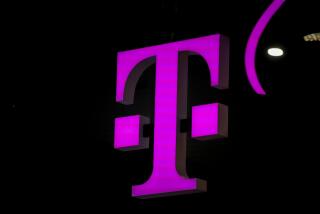Nokia in accord with Qualcomm
- Share via
Cellphone chip maker Qualcomm Inc. and Nokia, the world’s biggest maker of wireless phones, signed a new licensing agreement that ends global litigation and resolves concerns about Qualcomm’s future licensing program.
The agreement, released after the close of trading Wednesday, sent Qualcomm shares soaring 18% after hours.
The 15-year agreement covers the current and the next generation of high-speed mobile phone standards and gives Nokia a license to all of Qualcomm patents with a promise not to use any of its patents against the San Diego company, the firms said.
“This is one where saying this is important is not an overstatement,” said Rick Simonson, Nokia’s chief financial officer. “It’s a big relief for everybody.”
Nirav S. Parikh, senior vice president at Qualcomm investor TCW Group Inc., said the agreement sets the stage for industrywide issues over patents for third- and fourth-generation technologies.
“This also validates Qualcomm’s business model far into the future,” he said. He expects the company to release details of the settlement today.
Among the legal matters resolved between the two was a Nokia complaint pending before the European Commission. Qualcomm still faces lawsuits involving other companies, notably rival chip maker Broadcom Corp. in Irvine, but the Nokia litigation was considered the most disruptive.
Financial terms weren’t disclosed. Nokia will pay an upfront fee and continuing royalties to Qualcomm.
Investors have feared that Qualcomm’s inability to reach a new agreement with the Espoo, Finland, handset maker after an earlier contract expired last year could lead to demands for lower fees from other licensees.
“The terms of the new license agreement, including the financial and other value provided to Qualcomm, reflect our strong intellectual property position across many current and future generation technologies,” Qualcomm Chief Executive Paul Jacobs said.
Nokia’s chief executive, Olli-Pekka Kallasvuo, said: “The positive financial impact of this agreement is within Nokia’s original expectations and fully reflects our leading intellectual property and market positions.”
Qualcomm shares rose 72 cents to $44.82, then gained as much as $8.28 in after-hours trading following news of the settlement.
A deal was signaled earlier in the day when a trial between the two companies in Delaware Chancery Court in Wilmington was postponed and Qualcomm delayed its release of quarterly earnings.
Qualcomm, whose chips power Verizon Wireless and Sprint Nextel Corp. cellphones and networks, among others, gets most of its profit from licensing its patented technology to the carriers and the handset and related original equipment makers.
The company stopped recording sales from royalties paid by Nokia after April 9, 2007, saying it would wait until a judgment or a settlement of its dispute. The company estimated last year that Nokia’s royalties in 2008 would produce earnings per share of 25 cents to 30 cents.
Qualcomm and Nokia have sued each other and filed complaints with regulators in Europe, North America and Asia to gain an edge in their licensing battle. The Delaware trial was expected to resolve some licensing issues.
Earlier Wednesday a German court ruled against Qualcomm in a patent-infringement case Nokia had brought. It ruled, as two other international courts had, that Qualcomm’s claims related to GSM technology were invalid.
GSM, referring to the global system for mobile communications, is the most widely used wireless standard in the world. Although Qualcomm has some patents related to that standard, its business was built on its near-monopoly of CDMA, or code division multiple access, technology.
After announcing the agreement, Qualcomm reported a fiscal third-quarter profit that fell 6.3% as the company spent more to develop its MediaFlo mobile-television service.
Net income declined to $748 million, or 45 cents a share, from $798 million, or 47 cents, a year earlier. Revenue increased 19% to $2.8 billion for the three-month period that ended June 29.






